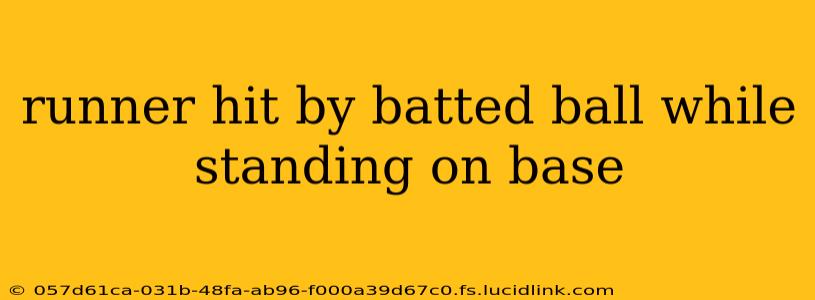Getting hit by a batted ball is a risk inherent in baseball, but the rules surrounding it become more complex when a runner is already on base. This article will clarify the situation, exploring the rulebook and answering common questions surrounding a runner being hit by a batted ball while occupying a base.
What Happens When a Runner is Hit by a Batted Ball on Base?
The key rule to understand is that if a runner is legally on a base and is hit by a batted ball, the ball is considered dead. This means play immediately stops. The runner is awarded first base, and any other runners advance one base. No further action is taken unless the umpire deems interference occurred (detailed below). This is true regardless of whether the batted ball is fair or foul. The critical element is that the runner was hit while legally occupying a base. This means they must be in contact with the base at the moment of being struck by the ball.
Is it Interference if a Runner is Hit by a Batted Ball?
Interference is a more nuanced aspect. While a runner being hit by a batted ball while on base usually doesn't constitute interference, it's not always clear cut. The umpire has the final call, and their judgment is based on whether the runner intentionally or unnecessarily obstructed the batted ball.
Factors the umpire considers for interference include:
- The runner's position: Was the runner fully on the base, or were they extending or reaching off the base in a way that obstructed the play?
- The trajectory of the ball: Did the runner make any movement that deliberately interfered with the ball's path?
- The intent of the runner: Did the runner actively try to prevent the ball from being fielded?
If the umpire deems interference, the runner is called out, and any runners who advanced as a result of the batted ball being dead are returned to their previous bases.
What if the batted ball hits the runner’s equipment while they are on the base?
The same rules generally apply. If the ball strikes the runner's glove, helmet, or other equipment while they are legally on base, the ball is dead, and the runner is awarded first base. However, as with a direct hit, the umpire may judge if the runner's equipment obstructed the play. Even the slightest movement that interferes can lead to an interference call.
What if the runner is hit by a fair ball while running between bases?
This situation is entirely different. A runner hit by a fair ball while running between bases is generally not awarded a base. The ball remains live, and the play continues. The outcome depends on whether the batted ball is caught (resulting in an out if the runner is tagged or the ball caught before reaching the base) or whether the runner can continue running safely.
Does the type of batted ball (line drive, ground ball, etc.) affect the ruling?
No, the type of batted ball does not affect the ruling. The key is that the runner must be legally on a base when hit. Whether it's a line drive, ground ball, or popup, the ball is dead, and the runner is awarded first base provided they were not interfering.
Can a runner appeal an interference call?
No, there's no appeal process for an umpire's judgment on interference. Their call is final.
In summary, while the basic rule is straightforward—a runner legally on base hit by a batted ball is awarded first base—understanding the potential for an interference call is crucial. The umpire's judgment on interference is final, based on their interpretation of the situation. This emphasizes the importance of runners maintaining their position on the base without interfering with the play.
